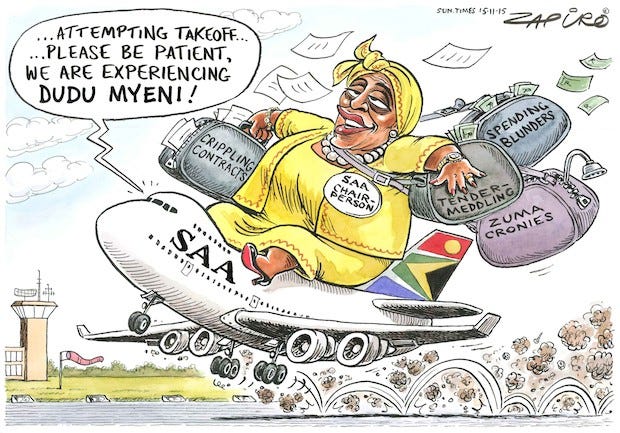How competition cracks down on corruption
For all the flack the private sector gets from both the left and the right, it has one redeeming feature that critics find difficult to avoid: competition. Take KPMG, the global auditing firm that has been at the center of the Gupta family scandal, in which South African taxpayers’ money was used to fund a wedding at Sun City in 2013. Upon the release of an internal report on the matter, KPMG CEO Trevor Hoole quit, as did the chair of the board and six other top staff. And in the weeks that followed, companies began to ditch KPMG as auditors, led by Magda Wierzycka’s Sygnia and followed by Hulisani, Munich Re, Sasfin, AVI, Telkom, and many others. Even that slowest moving of institutions – universities! – joined the KPMG culling. Sources within KMPG suggest that the mood is bleak.
KPMG is just one example. Bell Pottinger, the British public relations and reputations management firm, went into administration on 12 September after its Gupta-sponsored campaign to inflame racial discord in South Africa was exposed. And global consultancy McKinsey may be in even more trouble as the extent of its relations with Eskom and black-owned supplier Trillian (which was neither black-owned nor a legal supplier) becomes evident.
Market forces are at work. When companies built on trust and reputation lose it, clients will (and should) jump ship. It’s not personal, it’s business. Deloitte and PwC will benefit from their competitor’s indiscretion. But more than that, they would want to make sure that their own house is in order. Expect the quality of audits to increase significantly in future.
In contrast, those at the root of the problem are ensconced by the uncompetitiveness of government. The Gupta tentacles reach almost everywhere in the public sector, most notably in Treasury where minister Malusi Gigaba has suggested the Public Investment Corporation uses its considerable assets to support flailing state-owned enterprises like SAA. In wonderful irony, Cosatu threatening to replace the PIC with privately owned fund managers to oversee its members' pension funds. Competition discourages bad behaviour.
Politics, of course, is competitive. Elections pit politicians and their parties against each other, with voters, presumably, electing that party which would serve their interests best. But elections are fuzzy reflections of voter preferences. (Brexit and the recent US elections are good examples.) And, most importantly, they only occur every five years. Had KPMG been subject to the same slow process of five-year elections, would anyone have remembered their misdemeanour two years from now?
Corruption, though, is a crime, and any politician found guilty should be punished accordingly. But as we have seen in South Africa, the rot can be so deep that those with the power to act against the rampant corruption – the National Prosecuting Authority, the Hawks, the Public Protector – can choose to stay quiet. And when the media lose their ability to fairly report on these matters – exactly what Bell Pottinger’s campaign against white monopoly capital tried to do – the corrupt actions of politicians will go uncensored by an oblivious public.
That is why impartial government audits are so important. Critics often claim government officials pay too much attention to ‘clean audits’, that it takes the focus away from what politicians should be doing. Helen Zille, Western Cape premier, admitted as much in 2015: ‘Trying to achieve a “clean audit” can actually become a stumbling block to service delivery. It also puts a brake on innovation in government.’
But audits matter because they change behaviour. A 2016 NBER Working Paper Eric Avis, Claudio Ferraz and Frederico Finan examined the extent to which government audits in Brazil reduced corruption. Brazil’s anti-corruption programme randomly audits municipalities for their use of federal funds, and this randomness allows the authors to test whether audits have a causal impact on corruption. They find that being audited in the past reduces future corruption by 8 percent, while also increasing the likelihood of experiencing a subsequent legal action by 20 percent. The reduction in corruption comes mostly from the ‘audits increasing the perceived threat of the non-electoral costs of engaging in corruption’. In other words, audits make politicians less likely to award government contracts to friends at inflated prices, which saves public resources and improves service delivery.
This is why KMPG’s actions are so despicable, and why it should be punished in the market place. It was the last line of defence, and it failed in its duty to uncover the misuse of public funds. If guilty, the same fate will hopefully befall McKinsey too.
But it might not be that easy. Many South African industries are concentrated, and the oligopolies in them are often deeply entwined. KPMG remains the auditors of Standard Bank and Investec. The fall of KMPG will also strengthen the dominance of Deloitte and PwC, which may render them, if a scandal was to hit them, too big to fail. With few obvious competitor, McKinsey has, so far, remained largely unscathed.
More competition, in both oligopolistic industries and the public sector, is how you ensure that corruption is identified and punished.
*An edited version of this essay appeared on 2 November in Finweek magazine. Note that this essay was written before the Steinhoff debacle of the last week. My point stands, though. As details emerge of who is responsible for the Steinhoff mess, one thing remains clear: several members of the executive, including Marcus Jooste, CEO of Steinhoff, and Ben la Grange, chief executive of Steinhoff Africa Retail, have already lost their jobs. Where illegal actions have occurred, shareholders will make sure prosecutions follow. Compare Dudu Myeni, former boss of South African Airways, who, after finally being fired after years of mismanagement at SAA, landed a nice job as special adviser to the Minister of Transport. Image source: The Dudu Myeni Effect on SAA, by Zapiro.


